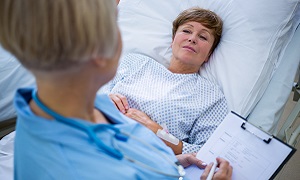Vulvectomy
Vulvectomy is a surgical procedure for removing some or all parts of the vulva. The outer portion of a woman’s genitals is known as the vulva. The surgery is performed to remove any diseased areas which might be cancerous, precancerous or be suffering from lichen sclerosus.
A vulva has several parts including the inner and outer labia and the clitoris. The vulva area includes the opening of the vagina as well as the opening of the urinary tract. In some rare cases, radical vulvectomy is also required which removes a large area of tissue including parts of the inside of the upper thighs, lower belly as well as the area located between the anus and the vagina.
The surgeon might also need to remove small glands which are known as lymph nodes in the groin.
Purpose
A vulvectomy is generally done to treat conditions such as:
- Precancer of the vulva
- Cancer of the vulva
- Skin cancer on the vulva
- Severe skin disease, like lichen sclerosis
- Severe disease of sweat glands in the groin
The surgery is generally considered when other treatment options such as ablation, fail to cure the problem.
Preparation
It is important for you to let your doctor know about any kind of medication that you take including herbal supplements. If you have any kind of allergy to anesthesia, you need to let him/her know as well. He/she might also recommend that you stop smoking, at least for the days prior to the surgery, as this can affect your recovery.
If you have gone through menopause, your doctor might have you use estrogen cream for some weeks prior to your surgery. This is for making the skin in the area healthier for surgery.
Procedure
During the surgery, you will first lie on the surgery table, after which you will receive the sedatives that will make you unconscious or numb the surgery area.
The surgeon will cut away an area of the diseased tissue. He/she will also remove a small amount of additional tissue around the area. This helps to ensure that all the diseased tissue is gone. The surgeon will then remove layers of tissue, which may include fat under your skin.
Next, your surgeon might bring together edges of the skin, and close them with stitches or sutures. The surgeon might use flaps of skin for closing some areas. Small patches of healthy skin might be left for creating new tissue. In some cases, the surgeon might also use a skin graft. In this method, an area of healthy skin is taken from a different part of your body. Then the skin graft is stitched back in place over parts of your vulva that need removal.
The surgeon will next cover the area with a dressing so that it can be protected. If a skin graft was done, then he/she might also require to cover the donor site.
A thin, flexible tube known as a catheter, might be required in your urethra and bladder for a week. This will help you drain urine from the bladder while you recover.
Aftercare & recovery
Sometimes you might need to stay in the hospital, for some days, after the procedure. You will need to learn how to clean your genitals and how to dry them carefully. You should receive specific instructions from your doctor. If any dressings are present, they will be looked at daily and removed when it is appropriate.
Next, your medical team will discuss with you what kind of medications you need to take, including ones for pain, blood clots, infection or prevention of constipation.
It is important to have the following items at home:
- Soft, clean towels for cleaning as well as drying yourself
- Sitz bath and a squirt bottle for vulvar hygiene, which you should receive when you leave the hospital
- Hairdryer with a cool setting or a circulating fan for drying the surgical areas
- Thermometer to check for fever, as this can be a sign of infection
- Loose clothing preferably of cotton
You might need a friend or family member to help you with your daily tasks till you feel better and are able to take care of yourself. It will take some time before your team tells you that it is okay to resume any normal activity.
Make sure to take your prescribed medications as directed so that you can prevent any pain, infection and/or constipation. If you see any new or worsening symptoms, let your doctor known immediately.
Taking deep breaths and resting well can also help you in pain management, as well as keep your lungs healthy.
Risks and side effects
Few risks as well as side effects are associated with a vulvectomy which includes the following:
- Bleeding, infection, or blood clots.
- Urinary tract infections
- Wound issues such as delayed healing, infections, and/or graft site failure, fluid-filled cyst formation.
- Swelling of the legs.
- Change in the appearance of your vulva
- Genital numbness
- Narrowed vaginal opening which can lead to a decrease in sexual pleasure and/or painful intercourse
- Discomfort and fatigue.
- Change in urine stream.



